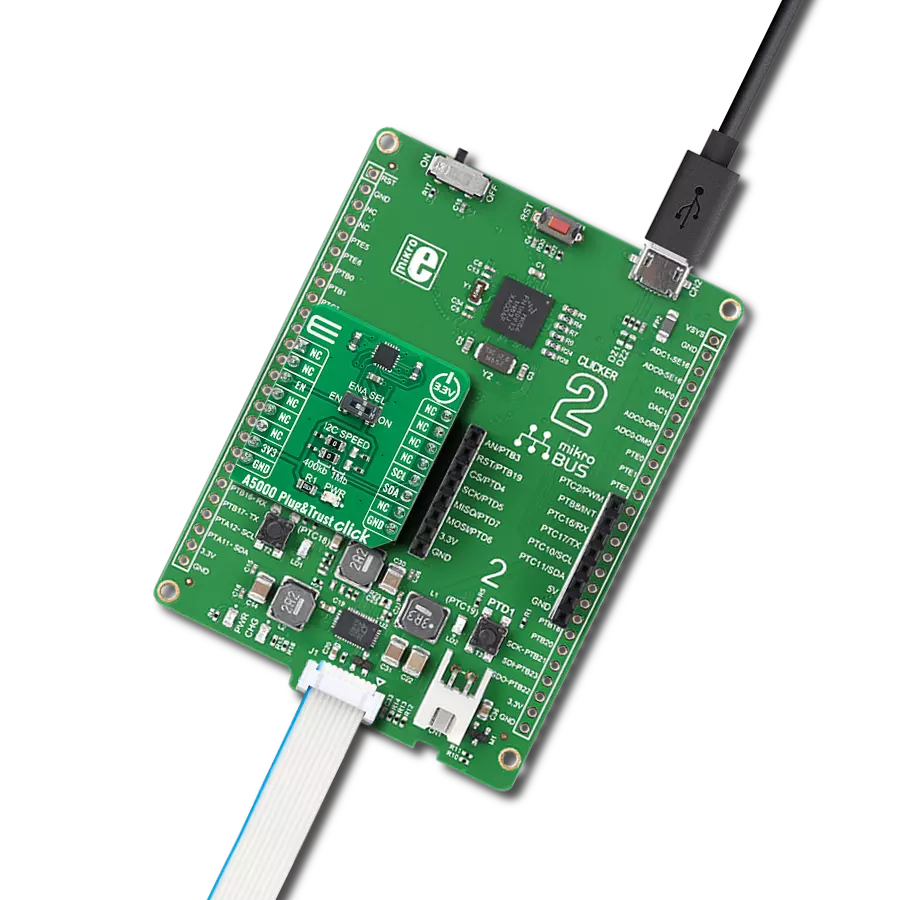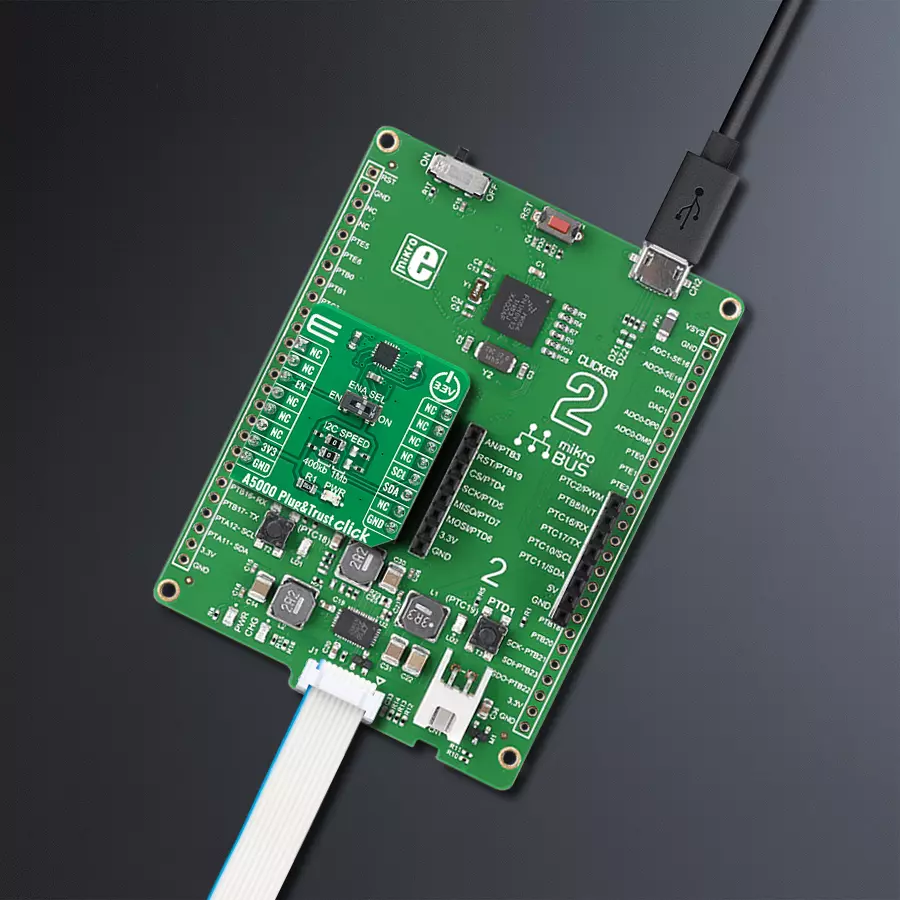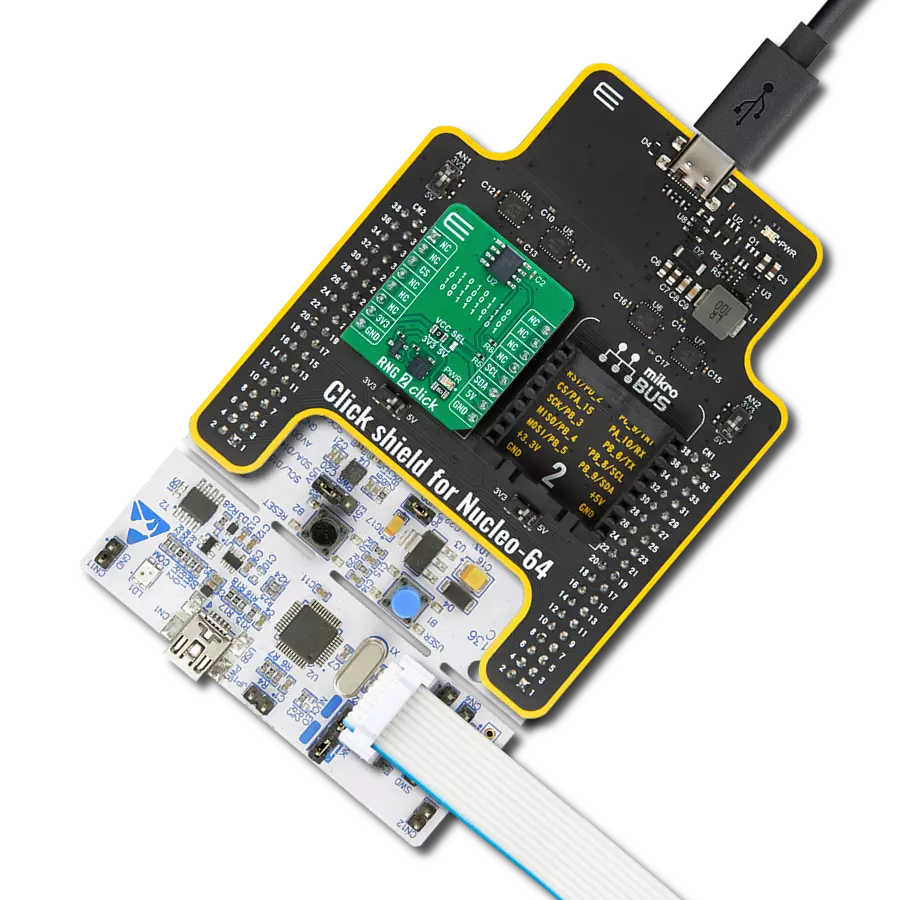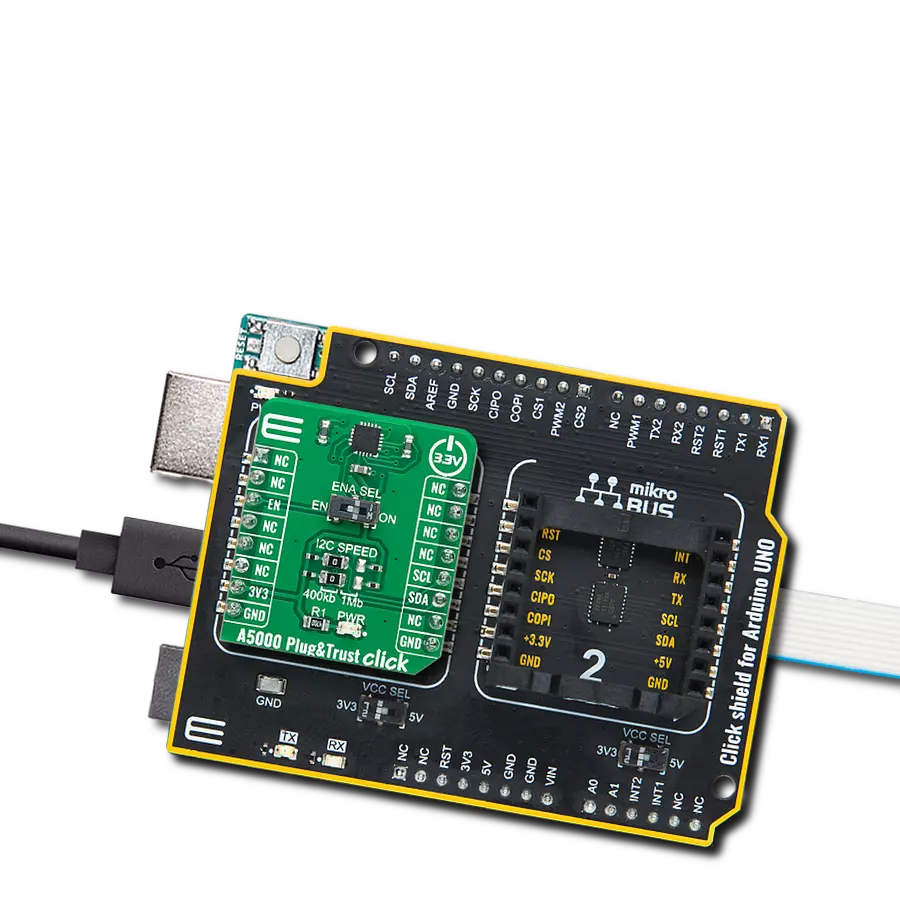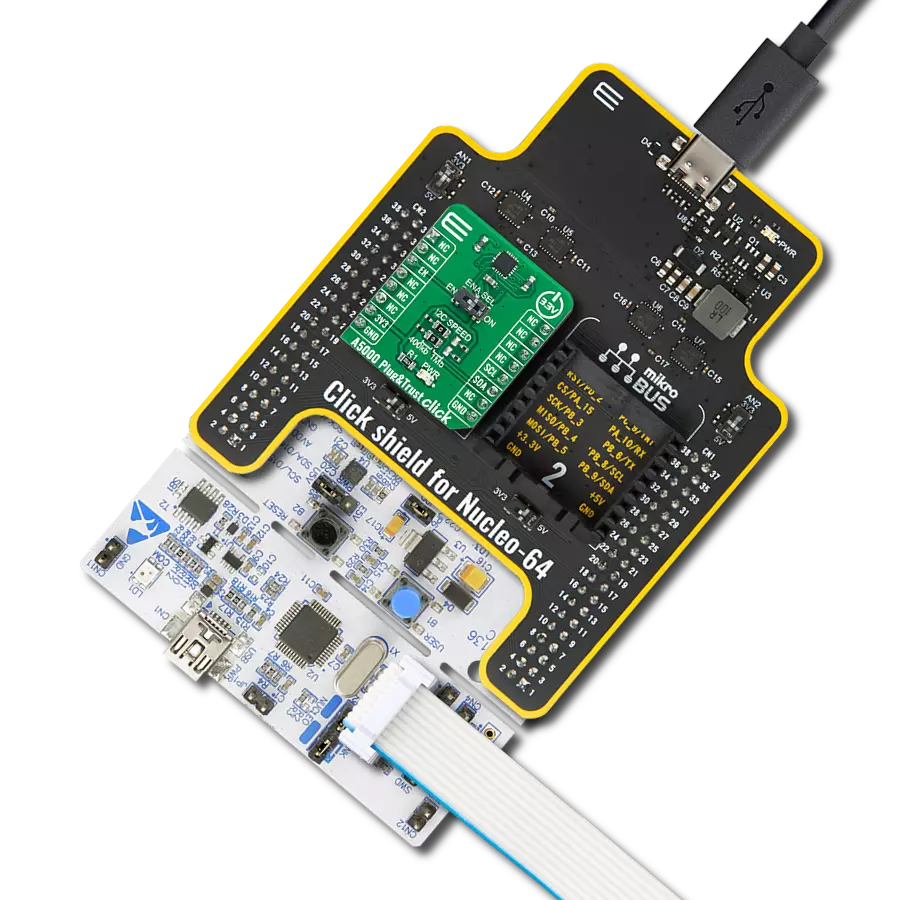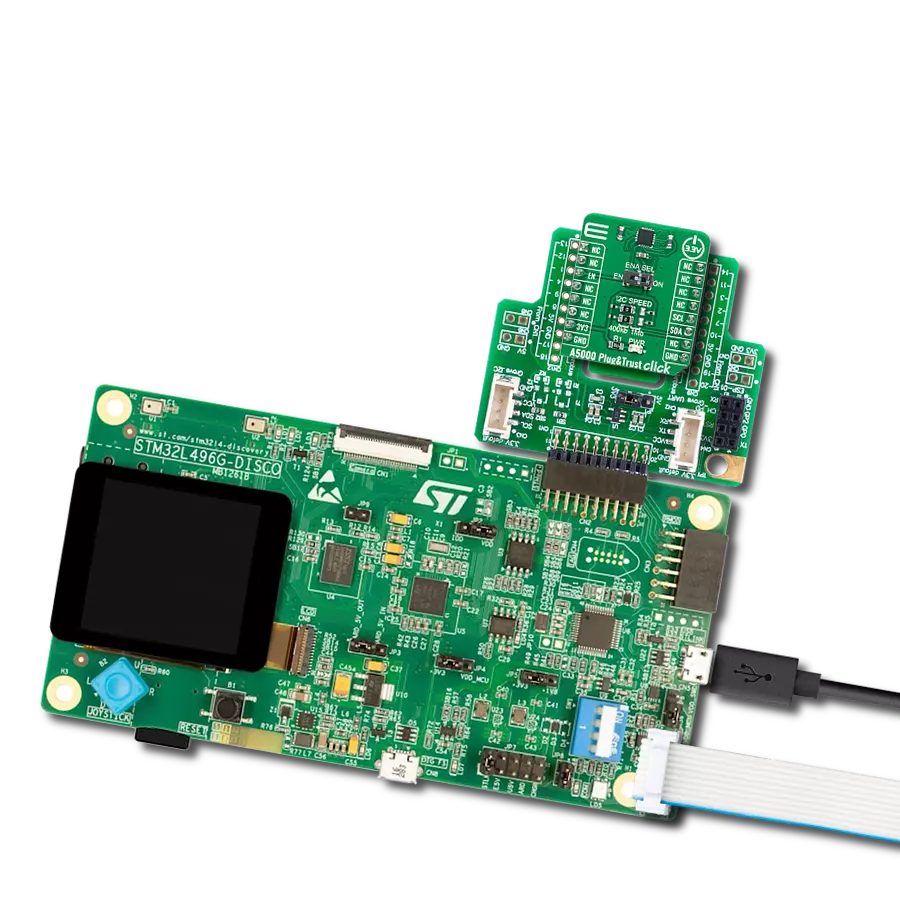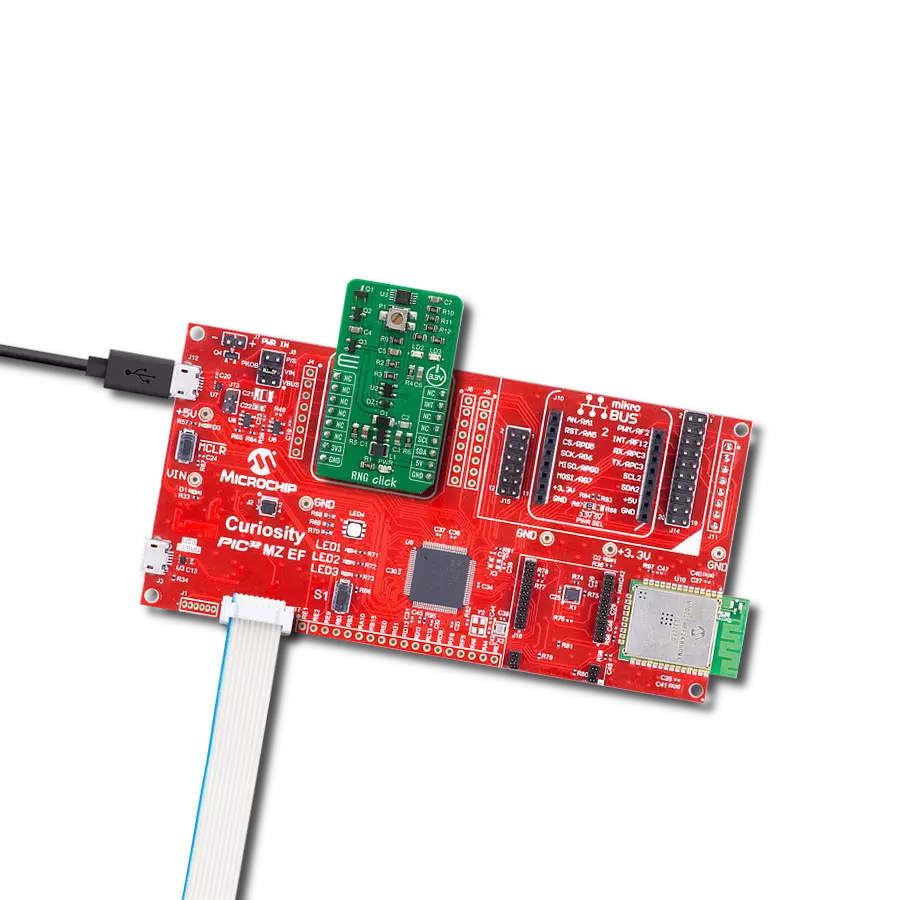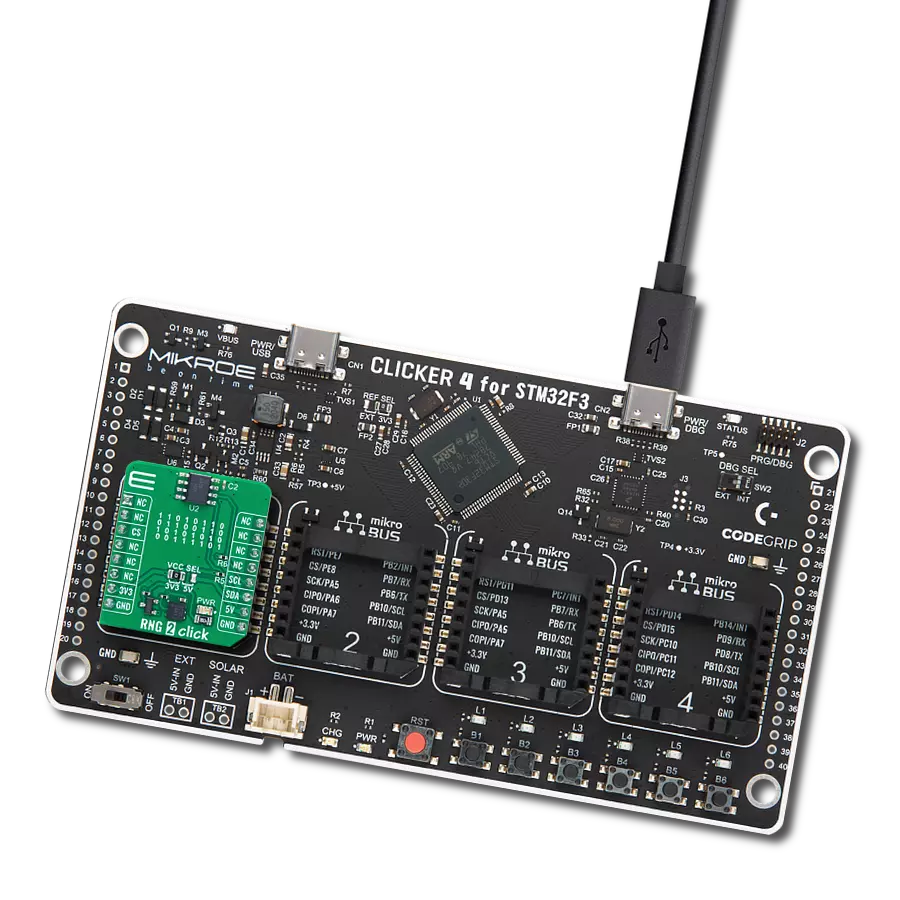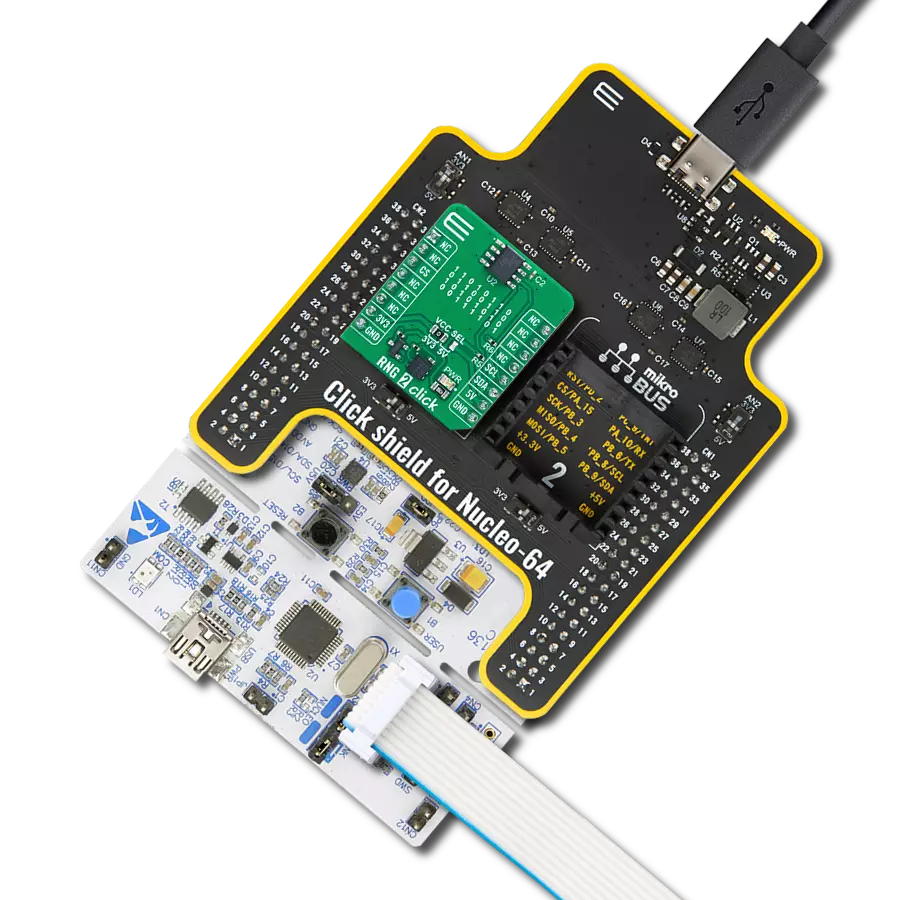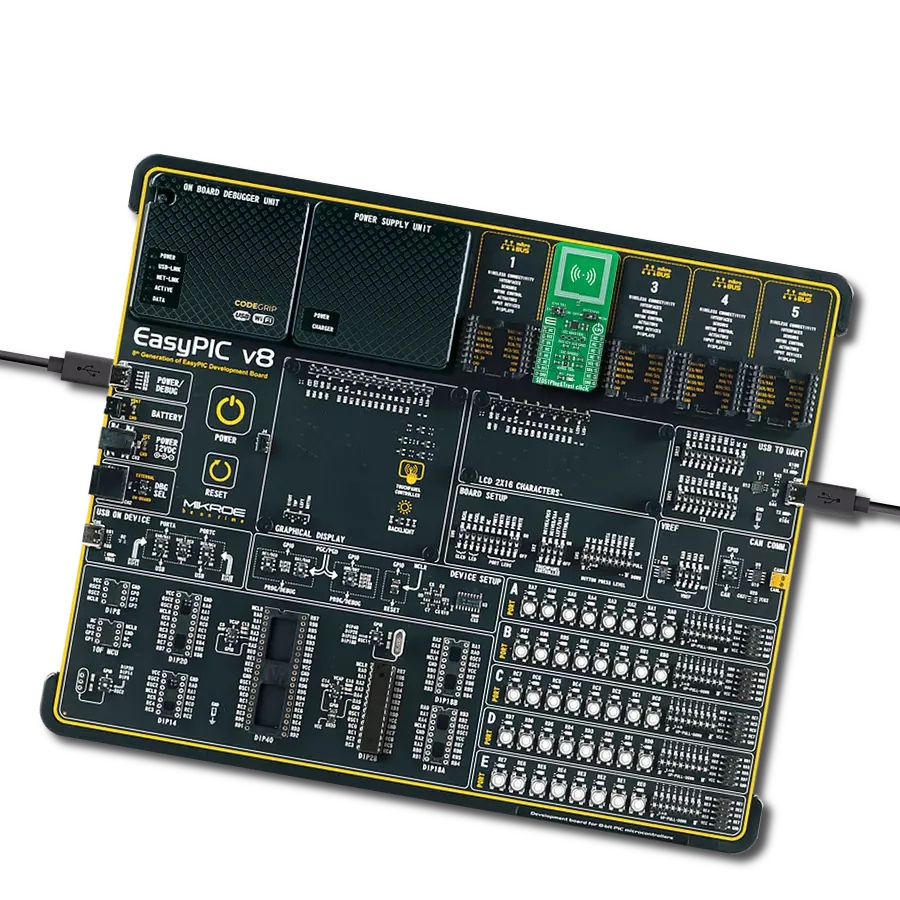Give your design the strongest IoT authentication capabilities
A
A
Hardware Overview
How does it work?
A5000 Plug&Trust Click is based on the A5000, a secure IoT authenticator based on Integral Security Architecture 3.0™ from NXP Semiconductors, providing safe and efficient protection for authentication and anti-counterfeit use cases. This Click board™ is designed to be part of an IoT system; works as an auxiliary security device attached to a host MCU. A Common Criteria EAL6+ certification proves the efficiency of the security measures. It comes with ECC asymmetric cryptographic and AES/3DES symmetric algorithms support to protect the A5000 even against sophisticated non-invasive and invasive attack scenarios. This board is ideal for many authentication use cases without writing security code. The A5000 operates autonomously based on an integrated Java Card operating system and a full-fledged authentication applet. The Authentication Applet
features a generic file system that stores secure objects and associated privilege management. Direct memory access is possible only by the NXP Authentication applet's fixed functionalities. With that, the content from memory is fully isolated from the host system. This Click board™ communicates with MCU using the standard I2C 2-Wire interface. The communication with the A5000 authenticator follows a command/response concept. It means that after sending the entire command to the authenticator, all data must be retrieved fully to allow sending of the following command. This board also allows users to select the appropriate I2C communication speed by onboard SMD jumpers labeled as I2C SPEED to a proper position marked as 400Kb and 1Mb. Note that all the jumpers must be lined to the same side, or the Click board™ may become unresponsive.
Besides, the A5000 provides a special power-saving mode offering maximum power saving. The way of activation of this mode is realized with the onboard switch marked as ENA SEL. In this way, Power-Saving Mode can be activated via the EN pin, routed to the CS pin of the mikroBUS™ socket, primarily by placing the switch to the EN position and then pulling the EN pin to a logic zero level. By placing the switch in the second position marked as ON, the A5000 is in normal operation mode. This Click board™ can only be operated from a 3.3V logic voltage level. Therefore, the board must perform appropriate logic voltage conversion before using MCUs with different logic levels. However, the Click board™ comes equipped with a library containing functions and an example code that can be used as a reference for further development.

Features overview
Development board
Clicker 2 for Kinetis is a compact starter development board that brings the flexibility of add-on Click boards™ to your favorite microcontroller, making it a perfect starter kit for implementing your ideas. It comes with an onboard 32-bit ARM Cortex-M4F microcontroller, the MK64FN1M0VDC12 from NXP Semiconductors, two mikroBUS™ sockets for Click board™ connectivity, a USB connector, LED indicators, buttons, a JTAG programmer connector, and two 26-pin headers for interfacing with external electronics. Its compact design with clear and easily recognizable silkscreen markings allows you to build gadgets with unique functionalities and
features quickly. Each part of the Clicker 2 for Kinetis development kit contains the components necessary for the most efficient operation of the same board. In addition to the possibility of choosing the Clicker 2 for Kinetis programming method, using a USB HID mikroBootloader or an external mikroProg connector for Kinetis programmer, the Clicker 2 board also includes a clean and regulated power supply module for the development kit. It provides two ways of board-powering; through the USB Micro-B cable, where onboard voltage regulators provide the appropriate voltage levels to each component on the board, or
using a Li-Polymer battery via an onboard battery connector. All communication methods that mikroBUS™ itself supports are on this board, including the well-established mikroBUS™ socket, reset button, and several user-configurable buttons and LED indicators. Clicker 2 for Kinetis is an integral part of the Mikroe ecosystem, allowing you to create a new application in minutes. Natively supported by Mikroe software tools, it covers many aspects of prototyping thanks to a considerable number of different Click boards™ (over a thousand boards), the number of which is growing every day.
Microcontroller Overview
MCU Card / MCU
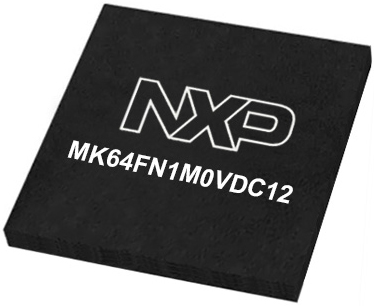
Architecture
ARM Cortex-M4
MCU Memory (KB)
1024
Silicon Vendor
NXP
Pin count
121
RAM (Bytes)
262144
Used MCU Pins
mikroBUS™ mapper
Take a closer look
Click board™ Schematic

Step by step
Project assembly
Software Support
Library Description
This library contains API for A5000 Plug&Trust Click driver.
Key functions:
a5000plugntrust_apdu_writeThis function writes a @b frame_data to device.a5000plugntrust_apdu_readThis function reads a @b frame_data from device.a5000plugntrust_apdu_transferThis function writes a @b frame_data, reads return data from the device, and stores it in @b frame_data.
Open Source
Code example
The complete application code and a ready-to-use project are available through the NECTO Studio Package Manager for direct installation in the NECTO Studio. The application code can also be found on the MIKROE GitHub account.
/*!
* @file main.c
* @brief A5000 Plug n Trust Click example
*
* # Description
* This application is showcasing basic functionality of A5000 Plug&Trust Click board.
* It gets identify data from device, selects card manager and applet.
* Then checks free memory, reads all objects and deletes not reserved ones.
* After that showcases a few of functionality:
* - Generating random data,
* - Creating, reading and deleting binary objects,
* - Creating AES symmetrical key and cipher with it;
* In the end it is showcasing funcionality in the endless loop.
*
* The demo application is composed of two sections :
*
* ## Application Init
* Reads indetifing data from device, and then selects card manager and applet.
* After that it reads free presistant memory, reads all objects and deletes
* objects that are not reserved by the Applet. Then it generates 2 byte of
* random data, and gets the version information from the Applet. That's
* followed up with creating binary object with 'MikroE' data inside. Then it checks
* if object is created and reads data back. After that, the object is deleted and
* it's checked if it still exists. Finally it creates 128AES key (16bytes), encrypts it
* and then decrypts data with that key, and in the end it deletes that key object.
*
* ## Application Task
* It generates 16bytes of data, writes it in binary object and then reads it back and displays
* on the USB UART. Then creates AES key and encrypts that generated data with it, and then decrypts it.
* In the end it deletes both AES key object and binary object that's created at the start of the task.
*
* @note
* For more information refer to documents from NXP: AN13187 and AN13266.
*
* @author Stefan Filipovic
*
*/
#include "board.h"
#include "log.h"
#include "a5000plugntrust.h"
// Library and log objects
static a5000plugntrust_t a5000plugntrust;
static log_t logger;
// Communication objects
static a5000plugntrust_apdu_t apdu_data;
static a5000plugntrust_frame_data_t frame_data;
// Parsing parameters
#define PARSE_BUF_LEN 0xFF
static uint32_t parse_index = 0;
static uint32_t parse_len = PARSE_BUF_LEN;
static uint8_t parse_data[ PARSE_BUF_LEN ] = { 0 };
/**
* @brief Reset parse data.
* @details Clears parse index, buffer and resets @b parse_len.
* @return Nothing.
* @note None.
*/
static void reset_parse ( void );
/**
* @brief Log buffer data to .
* @details Logs buffer data to UART Terminal
* @param[in] buf : Buffer to log.
* @param[in] buf_len : Length of buffer to log.
* @return Nothing.
* @note None.
*/
static void log_buf_hex ( uint8_t *buf, uint8_t buf_len );
/**
* @brief Log status data.
* @details Log status data from @b apdu_data.
* @return Nothing.
* @note None.
*/
static void log_status ( void );
/**
* @brief Log frame data.
* @details Logs data from @b frame_data.
* @return Nothing.
* @note None.
*/
static void log_rsp_data_default ( void );
/**
* @brief End APDU session.
* @details Sends request to end APDU session.
* @return Nothing.
* @note None.
*/
static void end_apdu_session ( void );
/**
* @brief Send request to reset device.
* @details Sends request to reset device and logs ATR data.
* @return Nothing.
* @note None.
*/
static void soft_reset( void );
/**
* @brief Check presistant free memory.
* @details Sends request to check presistant free
* memory from Applet, and logs it.
* @return Nothing.
* @note None.
*/
static void check_free_memory ( void );
/**
* @brief Reads 2 bytes of random data from Applet.
* @details Sends request to Applet to get 2 bytes of
* random data, and logs it.
* @return Nothing.
* @note None.
*/
static void get_random ( void );
/**
* @brief Read Object with UID.
* @details Checks if Object with UID exists and then
* reads its data, and logs it.
* @return Nothing.
* @note None.
*/
static void read_uid_object ( void );
/**
* @brief Checks the current version of the Applet.
* @details Send request to check the current version
* of Applet and logs return data.
* @return Nothing.
* @note None.
*/
static void get_version ( void );
/**
* @brief Get identify data from device.
* @details Sends request to get identification data
* from device, and logs data.
* @return Nothing.
* @note None.
*/
static void get_data_identify ( void );
/**
* @brief Create, write, read, and delete binary object.
* @details Creates and writes data to binary object.
* Checks if that object exists. Reads that binary object,
* and then delets it, and checks if its deleted.
* Every step and status will be logged.
* @return Nothing.
* @note None.
*/
static void create_check_delete ( void );
/**
* @brief List of all Applet objects and delete if not reserved.
* @details Create one random object and then lists all objects
* and delete ones that are not reserved.
* @return Nothing.
* @note None.
*/
static void list_and_delete_objects ( void );
/**
* @brief Select Applet.
* @details Select applet and log version info.
* @return Nothing.
* @note None.
*/
static void select_applet ( void );
/**
* @brief Create AES key, Encrypt and Decrypt data, and delete AES key.
* @details Creates 128AES Symmetrical key.
* Encrypts data with it. Decrypt data with that key.
* and in the end delete that AES key. Logs every status in the process.
* @return Nothing.
* @note None.
*/
static void aes_cipher ( void );
/**
* @brief Select Card manager.
* @details Select Card manager without return value request
* @return Nothing.
* @note None.
*/
static void select_card_manger ( void );
/**
* @brief Create 128 AES symmetrical key.
* @details Create 128 AES symetrical key and sets its value.
* @param[in] aes_id : Object ID.
* @param[in] aes_key : AES key value.
* @return Nothing.
* @note AES key value because it's 128 key should be 16 bytes of data.
*/
static void create_128_aes_key ( uint32_t aes_id, uint8_t *aes_key );
/**
* @brief Encrypt or decrypt data with AES key.
* @details Encrypt or decrypt data with AES key.
* @param[in] aes_id : Object ID.
* @param[in] cipher_type : Encrypt or decrypt macro @b[A5000PLUGNTRUST_P2_ENCRYPT_ONESHOT] || @b[A5000PLUGNTRUST_P2_DECRYPT_ONESHOT].
* @param[in] data_in : Input buffer.
* @param[out] data_out : Output buffer.
* @return @li @c 0 - Success,
* @li @c -1 - Error.
* @note None.
*/
static err_t cipher_data_with_aes_key ( uint32_t aes_id, uint8_t cipher_type, uint8_t *data_in, uint8_t *data_out );
void application_init ( void )
{
log_cfg_t log_cfg; /**< Logger config object. */
a5000plugntrust_cfg_t a5000plugntrust_cfg; /**< Click config object. */
/**
* Logger initialization.
* Default baud rate: 115200
* Default log level: LOG_LEVEL_DEBUG
* @note If USB_UART_RX and USB_UART_TX
* are defined as HAL_PIN_NC, you will
* need to define them manually for log to work.
* See @b LOG_MAP_USB_UART macro definition for detailed explanation.
*/
LOG_MAP_USB_UART( log_cfg );
log_init( &logger, &log_cfg );
log_info( &logger, " Application Init " );
// Click initialization.
a5000plugntrust_cfg_setup( &a5000plugntrust_cfg );
A5000PLUGNTRUST_MAP_MIKROBUS( a5000plugntrust_cfg, MIKROBUS_1 );
if ( I2C_MASTER_ERROR == a5000plugntrust_init( &a5000plugntrust, &a5000plugntrust_cfg ) )
{
log_error( &logger, " Communication init." );
for ( ; ; );
}
frame_data.apdu = &apdu_data;
soft_reset( );
Delay_ms ( 1000 );
Delay_ms ( 1000 );
get_data_identify( );
Delay_ms ( 1000 );
Delay_ms ( 1000 );
select_card_manger( );
Delay_ms ( 1000 );
Delay_ms ( 1000 );
select_applet( );
Delay_ms ( 1000 );
Delay_ms ( 1000 );
check_free_memory( );
Delay_ms ( 1000 );
Delay_ms ( 1000 );
list_and_delete_objects( );
Delay_ms ( 1000 );
Delay_ms ( 1000 );
get_random( );
Delay_ms ( 1000 );
Delay_ms ( 1000 );
read_uid_object( );
Delay_ms ( 1000 );
Delay_ms ( 1000 );
get_version( );
Delay_ms ( 1000 );
Delay_ms ( 1000 );
create_check_delete( );
Delay_ms ( 1000 );
Delay_ms ( 1000 );
aes_cipher( );
log_info( &logger, " Application Task " );
Delay_ms ( 1000 );
Delay_ms ( 1000 );
Delay_ms ( 1000 );
Delay_ms ( 1000 );
Delay_ms ( 1000 );
}
void application_task ( void )
{
#define DATA_LEN 16
static uint8_t aes_value[ DATA_LEN ] = { 0x40, 0x41, 0x42, 0x43,0x44, 0x45, 0x46, 0x47,
0x48, 0x49, 0x4A, 0x4B,0x4C, 0x4D, 0x4E, 0x4F };
static uint32_t binary_id = 0xBBBBBBBB;
static uint32_t aes_id = 0xCCCCCCCC;
uint8_t random_data[ DATA_LEN ] = { 0 };
uint8_t read_data[ DATA_LEN ] = { 0 };
uint8_t encrypted_data[ DATA_LEN ] = { 0 };
uint32_t read_len = DATA_LEN;
if ( A5000PLUGNTRUST_OK == a5000plugntrust_get_random_numbers( &a5000plugntrust, random_data, DATA_LEN ) )
{
log_printf( &logger, " > Generated random data: 0x" );
log_buf_hex( random_data, DATA_LEN );
log_printf( &logger, "\r\n" );
}
else
{
log_error( &logger, " Random" );
}
Delay_ms ( 1000 );
Delay_ms ( 1000 );
if ( A5000PLUGNTRUST_OBJECT_DOESNT_EXIST == a5000plugntrust_check_object_exist( &a5000plugntrust, binary_id ) )
{
log_printf( &logger, " Write random data to binary object...\r\n" );
if ( A5000PLUGNTRUST_OK != a5000plugntrust_write_binary_object( &a5000plugntrust, binary_id,
0, DATA_LEN, random_data ) )
{
log_error( &logger, " Write Binary" );
}
else
{
log_info( &logger, " Status OK" );
}
}
else
{
log_error( &logger, " Binary object already exist" );
}
Delay_ms ( 1000 );
Delay_ms ( 1000 );
if ( A5000PLUGNTRUST_OBJECT_DOES_EXISTS == a5000plugntrust_check_object_exist( &a5000plugntrust, binary_id ) )
{
if ( A5000PLUGNTRUST_OK == a5000plugntrust_read_object( &a5000plugntrust, binary_id, 0, 0,
read_data, &read_len ) )
{
log_printf( &logger, " > Read data from binary object: 0x" );
log_buf_hex( read_data, read_len );
log_printf( &logger, "\r\n" );
}
else
{
log_error( &logger, " Read binray object" );
}
}
else
{
log_error( &logger, " Binary object doesn't exist" );
}
Delay_ms ( 1000 );
Delay_ms ( 1000 );
log_printf( &logger, " Create AES key...\r\n" );
create_128_aes_key( aes_id, aes_value );
Delay_ms ( 1000 );
Delay_ms ( 1000 );
if ( A5000PLUGNTRUST_OK == cipher_data_with_aes_key( aes_id, A5000PLUGNTRUST_P2_ENCRYPT_ONESHOT,
read_data, encrypted_data ) )
{
log_printf( &logger, " > Encrypted data: 0x" );
log_buf_hex( encrypted_data, DATA_LEN );
log_printf( &logger, "\r\n" );
}
else
{
log_error( &logger, " Encrypting data" );
}
Delay_ms ( 1000 );
Delay_ms ( 1000 );
if ( A5000PLUGNTRUST_OK == cipher_data_with_aes_key( aes_id, A5000PLUGNTRUST_P2_DECRYPT_ONESHOT,
encrypted_data, read_data ) )
{
log_printf( &logger, " > Decrypted data: 0x" );
log_buf_hex( read_data, DATA_LEN );
log_printf( &logger, "\r\n" );
}
else
{
log_error( &logger, " Decrypting data" );
}
Delay_ms ( 1000 );
Delay_ms ( 1000 );
log_printf( &logger, " Delete Binary and AES object...\r\n" );
if ( ( A5000PLUGNTRUST_OK != a5000plugntrust_delete_object( &a5000plugntrust, binary_id ) ) ||
( A5000PLUGNTRUST_OK != a5000plugntrust_delete_object( &a5000plugntrust, aes_id ) ) )
{
log_error( &logger, " Deleting objects" );
}
log_printf( &logger, "*****************************************************************************\r\n" );
Delay_ms ( 1000 );
Delay_ms ( 1000 );
Delay_ms ( 1000 );
Delay_ms ( 1000 );
Delay_ms ( 1000 );
}
int main ( void )
{
/* Do not remove this line or clock might not be set correctly. */
#ifdef PREINIT_SUPPORTED
preinit();
#endif
application_init( );
for ( ; ; )
{
application_task( );
}
return 0;
}
static void reset_parse ( void )
{
parse_index = 0;
parse_len = PARSE_BUF_LEN;
memset( parse_data, 0, parse_len );
}
static void log_buf_hex ( uint8_t *buf, uint8_t buf_len )
{
for ( uint8_t i = 0; i < buf_len; i++ )
{
log_printf( &logger, "%0.2X", ( uint16_t ) buf[ i ] );
}
}
static void log_status ( void )
{
if ( ( ( frame_data.pcb & A5000PLUGNTRUST_PCB_BLOCK_R ) != A5000PLUGNTRUST_PCB_BLOCK_R ) &&
( ( frame_data.pcb & A5000PLUGNTRUST_PCB_BLOCK_S ) != A5000PLUGNTRUST_PCB_BLOCK_S ) )
{
switch ( frame_data.apdu->status )
{
case A5000PLUGNTRUST_SW_NOERROR:
{
log_info( &logger, " Status OK" );
break;
}
default:
{
log_error( &logger, " Status: 0x%.4X", frame_data.apdu->status );
}
}
}
}
static void log_rsp_data_default ( void )
{
log_printf( &logger, " >NAD: 0x%0.2X \r\n", ( uint16_t ) frame_data.nad );
log_printf( &logger, " >PCB: 0x%0.2X \r\n", ( uint16_t ) frame_data.pcb );
log_printf( &logger, " >LEN: 0x%0.2X \r\n", ( uint16_t ) frame_data.len );
if ( frame_data.len > 0 )
{
log_printf( &logger, " >APDU: 0x" );
}
log_buf_hex( frame_data.apdu->payload, frame_data.len );
if ( frame_data.len > 0 )
{
log_printf( &logger, " \r\n" );
}
log_printf( &logger, " >CRC: 0x%0.4X \r\n", frame_data.crc16 );
log_printf( &logger, "************************************************************************\r\n" );
}
static void soft_reset( void )
{
log_info( &logger, " Resetting device..." );
a5000plugntrust_atr_t atr_data;
if ( A5000PLUGNTRUST_OK == a5000plugntrust_sw_reset( &a5000plugntrust, &atr_data ) )
{
log_printf( &logger, " > Protocol version: %d\r\n", ( uint16_t ) atr_data.protocol_version );
log_printf( &logger, " > Length of Data Link Layer Parameters value: %d\r\n",
( uint16_t ) atr_data.data_link_layer_parameters_len );
log_printf( &logger, " > Data Link Layer Parameters: 0x" );
log_buf_hex( atr_data.data_link_layer_parameters, atr_data.data_link_layer_parameters_len );
log_printf( &logger, "\r\n" );
log_printf( &logger, " > Physical Layer ID: %d\r\n", ( uint16_t ) atr_data.physical_layer_id );
log_printf( &logger, " > Length of Physical Layer Parameters value: %d\r\n",
( uint16_t ) atr_data.physical_layer_parameters_len );
log_printf( &logger, " > Physical Layer Parameters: 0x" );
log_buf_hex( atr_data.physical_layer_parameters, atr_data.physical_layer_parameters_len );
log_printf( &logger, "\r\n" );
log_printf( &logger, " > Length of Historical Bytes value: %d\r\n", ( uint16_t ) atr_data.historical_len );
log_printf( &logger, " > Historical Bytes: 0x" );
log_buf_hex( atr_data.historical, atr_data.historical_len );
log_printf( &logger, "\r\n" );
}
else
{
log_error( &logger, " Resetting..." );
}
log_printf( &logger, "************************************************************************\r\n" );
}
static void check_free_memory ( void )
{
log_info( &logger, " Check free memory" );
uint16_t free_memory = 0;
if ( A5000PLUGNTRUST_OK == a5000plugntrust_get_free_memory( &a5000plugntrust,
A5000PLUGNTRUST_MEM_TRANSIENT_DESELECT, &free_memory ) )
{
log_printf( &logger, " > Free Memory: %d\r\n", free_memory );
}
else
{
log_error( &logger, " Reading Memory" );
}
log_printf( &logger, "************************************************************************\r\n" );
}
static void get_random ( void )
{
log_info( &logger, " Get Random" );
if ( A5000PLUGNTRUST_OK == a5000plugntrust_get_random_numbers( &a5000plugntrust, parse_data, 2 ) )
{
log_printf( &logger, " > Random data: 0x" );
log_buf_hex( parse_data, 2 );
log_printf( &logger, "\r\n" );
}
else
{
log_error( &logger, " Random" );
}
log_printf( &logger, "************************************************************************\r\n" );
}
static void read_uid_object ( void )
{
if ( A5000PLUGNTRUST_OBJECT_DOES_EXISTS == a5000plugntrust_check_object_exist( &a5000plugntrust,
A5000PLUGNTRUST_APPLET_RES_ID_UNIQUE_ID ) )
{
log_info( &logger, " Read object with Unique ID" );
if ( A5000PLUGNTRUST_OK == a5000plugntrust_read_object( &a5000plugntrust, A5000PLUGNTRUST_APPLET_RES_ID_UNIQUE_ID,
0, 0, parse_data, &parse_len ) )
{
log_printf( &logger, " > Object data: 0x" );
log_buf_hex( parse_data, parse_len );
log_printf( &logger, "\r\n" );
}
else
{
log_error( &logger, " Read object with Unique ID" );
}
log_printf( &logger, "************************************************************************\r\n" );
}
}
static void get_version ( void )
{
log_info( &logger, " Get Version" );
a5000plugntrust_version_info_t ver_info;
if ( A5000PLUGNTRUST_OK == a5000plugntrust_get_applet_info( &a5000plugntrust, &ver_info ) )
{
log_printf( &logger, " > Applet Version = %d.%d.%d\r\n", ( uint16_t ) ver_info.major_version,
( uint16_t ) ver_info.minor_version,
( uint16_t ) ver_info.patch_version );
log_printf( &logger, " > AppletConfig = 0x%0.4X\r\n", ver_info.applet_config );
log_printf( &logger, " > SecureBox = 0x%0.4X\r\n", ver_info.secure_box );
}
else
{
log_error( &logger, " Version Info" );
}
log_printf( &logger, "************************************************************************\r\n" );
}
static void get_data_identify ( void )
{
// select card
select_card_manger( );
end_apdu_session( );
// get data identify
typedef struct
{
uint8_t tag_value_proprietary_data; // 0xFE Tag value - proprietary data Only present if class byte is 0x80
uint8_t length_of_following_data; // 0x49 / 0x45 Length of following data Only present if class byte is 0x80
uint8_t tag_card_identification_data[ 0x02 ]; // 0xDF28 Tag card identification data Only present if class byte is 0x80
uint8_t length_of_card_identification_data; // 0x46 Length of card identification data Only present if class byte is 0x80
uint8_t tag_configuration_id; // 0x01 Tag configuration ID Identifies the configuration content
uint8_t length_configuration_id; // 0x0C Length configuration ID
uint8_t configuration_id[ 0x0C ]; // var Configuration ID
uint8_t tag_patch_id; // 0x02 Tag patch ID Identifies the patch level
uint8_t length_patch_id; // 0x08 Length patch ID
uint8_t patch_id[ 0x08 ]; // var Patch ID
uint8_t tag_platform_build_id1; // 0x03 Tag platform build ID1 Identifies the JCOP platform
uint8_t length_platform_build_id; // 0x18 Length platform build ID
uint8_t platform_build_id[ 0x18 ]; // var Platform build ID
uint8_t tag_fips_mode; // 0x052 Tag FIPS mode FIPS mode active
uint8_t length_fips_mode; // 0x01 Length FIPS mode
uint8_t fips_mode; // var FIPS mode 0x00 - FIPS mode not active, 0x01 - FIPS mode active
uint8_t tag_pre_perso_state; // 0x07 Tag pre-perso state Lists pre-perso state
uint8_t length_pre_perso_state; // 0x01 Length pre-perso state
// var Bit mask of pre-perso state bit0 = 1 = config module available,
// bit1 = 1 = transport state is active.
// Unused bits are set to 0x0.
uint8_t bit_mask_of_pre_perso_state;
uint8_t tag_rom_id; // '08' Tag ROM ID Indentifies the ROM content
uint8_t length_rom_id; // '08' Length ROM ID Normal ending
uint8_t rom_id[ 0x08 ]; // var ROM ID
uint8_t status_word_sw[ 0x02 ]; // 9000h Status Word (SW)
} identify_rsp_t;
identify_rsp_t identify_rsp = { 0 };
uint32_t prsp_len = sizeof ( identify_rsp_t );
log_info( &logger, " Get data identify" );
frame_data.pcb = A5000PLUGNTRUST_PCB_BLOCK_I;
frame_data.len = 8;
frame_data.apdu->cla = A5000PLUGNTRUST_CLA_NOT_SECURE;
frame_data.apdu->ins = 0xCA;
frame_data.apdu->p1 = 0x00;
frame_data.apdu->p2 = 0xFE;
frame_data.apdu->payload_len = 0x02;
frame_data.apdu->rsp_len = 0x00;
uint8_t df28[ 2 ] = { 0xDF, 0x28 };
memcpy( frame_data.apdu->payload, df28, 2 );
a5000plugntrust_apdu_transfer( &a5000plugntrust, &frame_data );
if ( frame_data.len == prsp_len )
{
memcpy( ( uint8_t * )&identify_rsp, frame_data.apdu->payload, prsp_len );
log_printf( &logger, " > Tag value: 0x%0.2X\r\n", ( uint16_t ) identify_rsp.tag_value_proprietary_data );
log_printf( &logger, " > Length value: %d\r\n", ( uint16_t ) identify_rsp.length_of_following_data );
log_printf( &logger, " > Tag Card ID value: 0x" );
log_buf_hex( identify_rsp.tag_card_identification_data, 2 );
log_printf( &logger, "\r\n" );
log_printf( &logger, " > Length of Card ID value: %d\r\n", ( uint16_t ) identify_rsp.length_of_card_identification_data );
log_printf( &logger, " > Tag of Configuration ID value: 0x%0.2X\r\n", ( uint16_t ) identify_rsp.tag_configuration_id );
log_printf( &logger, " > Length of Configuration ID value: %d\r\n", ( uint16_t ) identify_rsp.length_configuration_id );
log_printf( &logger, " > Configuration ID: 0x" );
log_buf_hex( identify_rsp.configuration_id, identify_rsp.length_configuration_id );
log_printf( &logger, "\r\n" );
log_printf( &logger, " > Tag of Patch ID value: 0x%0.2X\r\n", ( uint16_t ) identify_rsp.tag_patch_id );
log_printf( &logger, " > Length of Patch ID value: %d\r\n", ( uint16_t ) identify_rsp.length_patch_id );
log_printf( &logger, " > Patch ID: 0x" );
log_buf_hex( identify_rsp.patch_id, identify_rsp.length_patch_id );
log_printf( &logger, "\r\n" );
log_printf( &logger, " > Tag of Platform Build ID1 value: 0x%0.2X\r\n", ( uint16_t ) identify_rsp.tag_platform_build_id1 );
log_printf( &logger, " > Length of Platform Build ID1 value: %d\r\n", ( uint16_t ) identify_rsp.length_platform_build_id );
log_printf( &logger, " > Platform Build ID1: 0x" );
log_buf_hex( identify_rsp.platform_build_id, identify_rsp.length_platform_build_id );
log_printf( &logger, "\r\n" );
log_printf( &logger, " > Tag of FIPS Mode value: 0x%0.2X\r\n", ( uint16_t ) identify_rsp.tag_fips_mode );
log_printf( &logger, " > Length of FIPS Mode value: %d\r\n", ( uint16_t ) identify_rsp.length_fips_mode );
log_printf( &logger, " > FIPS Mode: 0x" );
log_buf_hex( &identify_rsp.fips_mode, identify_rsp.length_fips_mode );
log_printf( &logger, "\r\n" );
log_printf( &logger, " > Tag of Pre-Preso State value: 0x%0.2X\r\n", ( uint16_t ) identify_rsp.tag_pre_perso_state );
log_printf( &logger, " > Length of Pre-Preso State value: %d\r\n", ( uint16_t ) identify_rsp.length_pre_perso_state );
log_printf( &logger, " > Pre-Preso State: 0x" );
log_buf_hex( &identify_rsp.bit_mask_of_pre_perso_state, identify_rsp.length_pre_perso_state );
log_printf( &logger, "\r\n" );
log_printf( &logger, " > Tag of ROM ID value: 0x%0.2X\r\n", ( uint16_t ) identify_rsp.tag_rom_id );
log_printf( &logger, " > Length of ROM ID value: %d\r\n", ( uint16_t ) identify_rsp.length_rom_id );
log_printf( &logger, " > ROM ID: 0x" );
log_buf_hex( identify_rsp.rom_id, identify_rsp.length_rom_id );
log_printf( &logger, "\r\n" );
log_printf( &logger, " > Status Word: 0x" );
log_buf_hex( identify_rsp.status_word_sw, 2 );
log_printf( &logger, "\r\n" );
}
else
{
log_error( &logger, " Size Error" );
}
log_printf( &logger, "************************************************************************\r\n" );
end_apdu_session( );
}
static void end_apdu_session ( void )
{
if ( A5000PLUGNTRUST_OK != a5000plugntrust_end_apdu_session( &a5000plugntrust ) )
{
log_error( &logger, " End APDU session" );
}
}
static void create_check_delete ( void )
{
// create binary object
log_info( &logger, " Write Binary" );
uint8_t data_buf[ 7 ] = "MikroE";
uint32_t binary_id = 0xAAAAAAAAul;
if ( A5000PLUGNTRUST_OK != a5000plugntrust_write_binary_object( &a5000plugntrust, binary_id, 0, 6, data_buf ) )
{
log_error( &logger, " Write Binary" );
}
log_printf( &logger, "************************************************************************\r\n" );
// check if object exists
log_info( &logger, " Check object exists" );
if ( A5000PLUGNTRUST_OBJECT_DOES_EXISTS == a5000plugntrust_check_object_exist( &a5000plugntrust, binary_id ) )
{
log_printf( &logger, " > Object exist\r\n" );
}
else
{
log_printf( &logger, " > Object doesn't exist\r\n" );
}
log_printf( &logger, "************************************************************************\r\n" );
// read binary object
log_info( &logger, " Read object" );
reset_parse();
if ( A5000PLUGNTRUST_OK == a5000plugntrust_read_object( &a5000plugntrust, binary_id, 0, 0, parse_data, &parse_len ) )
{
log_printf( &logger, " > Object data: %s\r\n", parse_data );
}
else
{
log_error( &logger, " Read binary object" );
}
log_printf( &logger, "************************************************************************\r\n" );
// delete object
log_info( &logger, " Delete Secure Object" );
if ( A5000PLUGNTRUST_OK == a5000plugntrust_delete_object( &a5000plugntrust, binary_id ) )
{
log_printf( &logger, " Object 0x%0.8LX deleted\r\n", binary_id );
}
else
{
log_error( &logger, " Delete Object" );
}
log_printf( &logger, "************************************************************************\r\n" );
// check if object exists
log_info( &logger, " Check object exists" );
if ( A5000PLUGNTRUST_OBJECT_DOES_EXISTS == a5000plugntrust_check_object_exist( &a5000plugntrust, binary_id ) )
{
log_printf( &logger, " > Object exist\r\n" );
}
else
{
log_printf( &logger, " > Object doesn't exist\r\n" );
}
log_printf( &logger, "************************************************************************\r\n" );
}
static void list_and_delete_objects( void )
{
a5000plugntrust_write_binary_object( &a5000plugntrust, 0xAABBCCDDul, 0, 4, "Data" );
log_info( &logger, " Get Object list" );
uint32_t ids[ 30 ] = { 0 };
uint8_t len = 0;
if ( A5000PLUGNTRUST_OK == a5000plugntrust_object_id_list( &a5000plugntrust, ids, &len ) )
{
log_info( &logger, " List len: %d", ( uint16_t )len );
for ( uint8_t cnt = 0; cnt < len; cnt++ )
{ // if not NXP defined objectect delete that object
if ( ( A5000PLUGNTRUST_OBJID_SE05X_APPLET_RES_START != ( A5000PLUGNTRUST_OBJID_APPLET_MASK & ids[ cnt ] ) ) &&
( A5000PLUGNTRUST_SSS_OBJID_DEMO_AUTH_START != ( A5000PLUGNTRUST_OBJID_APPLET_MASK & ids[ cnt ] ) ) &&
( A5000PLUGNTRUST_SSS_OBJID_IOT_HUB_A_START != ( A5000PLUGNTRUST_OBJID_IOT_MASK & ids[ cnt ] ) ) )
{
if ( A5000PLUGNTRUST_OK == a5000plugntrust_delete_object( &a5000plugntrust, ids[ cnt ] ) )
{
log_printf( &logger, " > Object Deleted 0x%.8LX\r\n", ids[ cnt ] );
}
else
{
log_error( &logger, " Delecte Object 0x%.8LX", ids[ cnt ] );
}
}
else
{
log_printf( &logger, " > Object ID: 0x%.8LX\r\n", ids[ cnt ] );
}
}
}
else
{
log_error( &logger, " Object ID List" );
}
log_printf( &logger, "************************************************************************\r\n" );
}
static void select_applet ( void )
{
log_info( &logger, " Select SE050 Applet" );
a5000plugntrust_version_info_t ver_info;
a5000plugntrust_select_applet( &a5000plugntrust, A5000PLUGNTRUST_PCB_BLOCK_I_NS_ENCODE, &ver_info );
log_printf( &logger, " > Applet Version = %d.%d.%d\r\n", ( uint16_t ) ver_info.major_version,
( uint16_t ) ver_info.minor_version,
( uint16_t ) ver_info.patch_version );
log_printf( &logger, " > AppletConfig = 0x%0.4X\r\n", ver_info.applet_config );
log_printf( &logger, " > SecureBox = 0x%0.4X\r\n", ver_info.secure_box );
log_printf( &logger, "************************************************************************\r\n" );
}
static void aes_cipher ( void )
{
// Create AES Key
log_info( &logger, " Write AES Key" );
#define AES_DATA_SIZE 16
uint8_t aes_value[ AES_DATA_SIZE ] = { 0x40, 0x41, 0x42, 0x43,0x44, 0x45, 0x46, 0x47,
0x48, 0x49, 0x4A, 0x4B,0x4C, 0x4D, 0x4E, 0x4F };
uint32_t symm_id = 0x12345678ul;
create_128_aes_key( symm_id, aes_value );
// Encrypt Data
if ( A5000PLUGNTRUST_OBJECT_DOES_EXISTS == a5000plugntrust_check_object_exist( &a5000plugntrust, symm_id ) )
{
log_info( &logger, " Encrypt Data" );
uint8_t data_value[ 16 ] = { ' ', '>', 'P', 'l', 'u', 'g', ' ', '&', ' ', 'T', 'r', 'u', 's', 't', '<', ' ' };
reset_parse( );
if ( A5000PLUGNTRUST_OK == cipher_data_with_aes_key( symm_id, A5000PLUGNTRUST_P2_ENCRYPT_ONESHOT,
data_value, parse_data ) )
{
log_printf( &logger, " > Encrypted data hex: 0x" );
log_buf_hex( parse_data, AES_DATA_SIZE );
log_printf( &logger, "\r\n" );
log_printf( &logger, " > Encrypted data string: %s\r\n", parse_data );
}
else
{
log_error( &logger, " Parse error" );
}
}
else
{
log_printf( &logger, " > Object doesn't exist\r\n" );
}
log_printf( &logger, "************************************************************************\r\n" );
// Decrypt Data
log_info( &logger, " Decrypt Data" );
if ( A5000PLUGNTRUST_OK == cipher_data_with_aes_key( symm_id, A5000PLUGNTRUST_P2_DECRYPT_ONESHOT,
parse_data, parse_data ) )
{
log_printf( &logger, " > Decrypted data hex: 0x" );
log_buf_hex( parse_data, parse_len );
log_printf( &logger, "\r\n" );
log_printf( &logger, " > Decrypted data string: %s\r\n", parse_data );
}
else
{
log_error( &logger, " Parse error" );
}
log_printf( &logger, "************************************************************************\r\n" );
// Delete Object
log_info( &logger, " Delete Secure Object" );
if ( A5000PLUGNTRUST_OK == a5000plugntrust_delete_object( &a5000plugntrust, symm_id ) )
{
log_printf( &logger, " Object 0x%0.8LX deleted\r\n", symm_id );
}
else
{
log_error( &logger, " Delete Object" );
}
log_printf( &logger, "************************************************************************\r\n" );
}
static void select_card_manger ( void )
{
log_info( &logger, " Select the card manager " );
if ( A5000PLUGNTRUST_OK != a5000plugntrust_select_card_manager( &a5000plugntrust,
A5000PLUGNTRUST_CARD_MANAGER_WITHOUT_RSP, 0, 0 ) )
{
log_error( &logger, " Card manager" );
}
log_printf( &logger, "************************************************************************\r\n" );
}
static void create_128_aes_key ( uint32_t aes_id, uint8_t *aes_key )
{
#define AES_KEY_SIZE 16
frame_data.pcb = A5000PLUGNTRUST_PCB_BLOCK_I;
frame_data.apdu->cla = A5000PLUGNTRUST_CLA_NOT_SECURE;
frame_data.apdu->ins = A5000PLUGNTRUST_INS_WRITE | A5000PLUGNTRUST_INS_TRANSIENT;
frame_data.apdu->p1 = A5000PLUGNTRUST_P1_AES;
frame_data.apdu->p2 = A5000PLUGNTRUST_P2_DEFAULT;
frame_data.apdu->payload_len = 0;// reset apdu payload_len
frame_data.apdu->rsp_len = 0;// reset apdu le value
a5000plugntrust_set_tlv_u32( frame_data.apdu->payload, &frame_data.apdu->payload_len,
A5000PLUGNTRUST_TLV_TAG_1, aes_id ); // AES key ID
a5000plugntrust_set_tlv_u8buf( frame_data.apdu->payload, &frame_data.apdu->payload_len,
A5000PLUGNTRUST_TLV_TAG_3, aes_key, AES_KEY_SIZE ); // AES key value
frame_data.len = a5000plugntrust_calculate_apdu_size( frame_data.apdu ); // calculate apdu size
a5000plugntrust_apdu_transfer( &a5000plugntrust, &frame_data );
log_status( );
end_apdu_session( );
}
static err_t cipher_data_with_aes_key ( uint32_t aes_id, uint8_t cipher_type, uint8_t *data_in, uint8_t *data_out )
{
// check if object with aes_id exists
if ( A5000PLUGNTRUST_OBJECT_DOES_EXISTS == a5000plugntrust_check_object_exist( &a5000plugntrust, aes_id ) )
{
frame_data.pcb = A5000PLUGNTRUST_PCB_BLOCK_I;
frame_data.apdu->cla = A5000PLUGNTRUST_CLA_NOT_SECURE;
frame_data.apdu->ins = A5000PLUGNTRUST_INS_CRYPTO;
frame_data.apdu->p1 = A5000PLUGNTRUST_P1_CIPHER;
frame_data.apdu->p2 = cipher_type; // A5000PLUGNTRUST_P2_ENCRYPT_ONESHOT || A5000PLUGNTRUST_P2_DECRYPT_ONESHOT
frame_data.apdu->payload_len = 0;
frame_data.apdu->rsp_len = 0;
frame_data.len = 0;
a5000plugntrust_set_tlv_u32( frame_data.apdu->payload, &frame_data.apdu->payload_len,
A5000PLUGNTRUST_TLV_TAG_1, aes_id ); // set aes key to be used
a5000plugntrust_set_tlv_u8( frame_data.apdu->payload, &frame_data.apdu->payload_len,
A5000PLUGNTRUST_TLV_TAG_2, A5000PLUGNTRUST_CIPHER_AES_CTR ); // set ae cipher type to be used
a5000plugntrust_set_tlv_u8buf( frame_data.apdu->payload, &frame_data.apdu->payload_len,
A5000PLUGNTRUST_TLV_TAG_3, data_in, 16 ); // set data to encrypt/decrypt
frame_data.len = a5000plugntrust_calculate_apdu_size( frame_data.apdu ); // calculate apdu data
frame_data.len++; // increment data
a5000plugntrust_apdu_transfer( &a5000plugntrust, &frame_data );
reset_parse( ); // reset prase data
// get encryted/decrypted data
if ( A5000PLUGNTRUST_OK == a5000plugntrust_get_tlv_u8buf( frame_data.apdu->payload, &parse_index, frame_data.len,
A5000PLUGNTRUST_TLV_TAG_1, data_out, &parse_len ) )
{
end_apdu_session( );
return A5000PLUGNTRUST_OK;
}
else
{
end_apdu_session( );
return A5000PLUGNTRUST_ERROR;
}
}
else
{
return A5000PLUGNTRUST_ERROR;
}
}
// ------------------------------------------------------------------------ END
Additional Support
Resources
Category:Encryption
